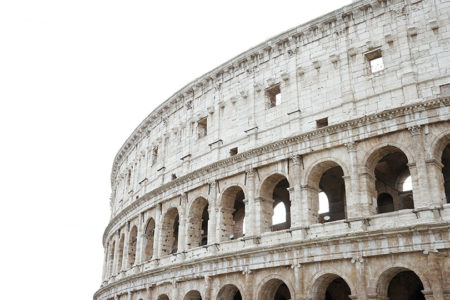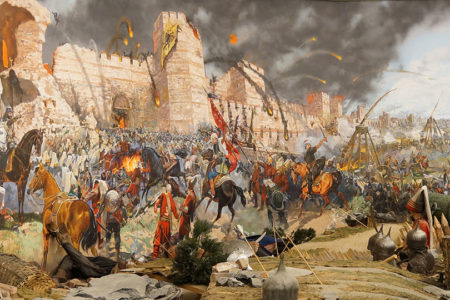Jonah’s Rancor
Jonah 4:1–11
Editor’s Note: With this article, we conclude our series on the book of Jonah. In the next issue, David Levy will begin a series on the New Testament book of Hebrews.
If we were writing the book of Jonah, how would we end the story? We’d probably have Jonah rejoicing over being restored from disobedience, rescued from the belly of a fish, recommissioned in the Lord’s service, and returned to Nineveh to preach a great revival.
However, God’s ways are not our ways. In chapter 4, the book concludes by contrasting Jonah’s ungodly attitude toward Nineveh’s redemption with God’s love and grace toward all people. Keep in mind that Nineveh was located in the country we know today as Iraq.
Jonah’s Reaction
Jonah was an unhappy prophet, to say the least. God did exactly what Jonah expected He would do. He spared Nineveh from judgment when the city repented (3:10). But God’s action “displeased Jonah exceedingly [it was evil to Jonah], and he became angry [literally, “became hot”]” (4:1).
How out of character for a prophet to seethe at seeing God extend grace to a nation that turns to Him. Jonah should have rejoiced and thanked God for what He had accomplished in bringing Nineveh to repentance. But the picture we see here is far different. Jonah was embittered and indignant. Why? Because he considered God’s clemency a great evil.
Note the interesting comparison. Like Nineveh, Jonah had been the object of God’s extreme displeasure and divine anger; but the prophet was shown mercy. Jonah had been saved from a storm, drowning, and death in a fish’s belly (1:4–5, 15, 17). But hatred and prejudice blinded Jonah to the fact that God had bestowed on him the same mercy He had extended to Nineveh.
In anger, Jonah prayed to the Almighty and had the audacity to rebuke Him for forgiving Nineveh:
So he prayed to the Lᴏʀᴅ, and said, “Ah, Lᴏʀᴅ, was not this what I said when I was still in my country? Therefore I fled previously to Tarshish; for I know that You are a gracious and merciful God, slow to anger and abundant in lovingkindness, one who relents from doing harm” (4:2).
He quoted Joel 2:13 almost word for word, proving he knew God’s nature was one of grace and compassion. So he fled to Tarshish because he did not want to preach to Nineveh and see God save the nation. He knew the Lord would have mercy on the city if it manifested any sign of repentance (cf. Ex. 34:6–7). Without shame, the prophet laid bare the motivating impulse of his heart: an unbelievable loathing for Nineveh that was deplorable for anyone, let alone for a prophet of God.
Jonah’s Request
Jonah became so despondent and depressed over God’s gracious stay of execution that he prayed for God to take his life: “Therefore now, O Lᴏʀᴅ, please take my life from me, for it is better for me to die than to live!” (4:3). Earlier Jonah had prayed to live and rejoiced when God delivered him from death. But now, like a fickle or spoiled child unable to get his way, he prayed to die. Jonah’s prejudice shows the depth of his depravity—and that of all humankind.
Jonah’s prayer is indefensible. First, he discriminated against the people of Nineveh. Second, he had a spiteful, unloving spirit toward those outside Israel. Third, he discredited God by criticizing His wisdom in showing grace and mercy to Nineveh. Fourth, he disdained God’s divine love for Nineveh. Fifth, he was defeated by his own selfish thoughts. In essence, he told God, “Your way of dealing with sinful people like the Ninevites is not the right way. If You are going to show mercy to Nineveh, count me out. I do not want to serve You anymore. Just let me die.”
Sixth, he wanted to die, which was selfish in itself. Seventh, he allowed the Devil to gain a foothold in his life through discouragement, which led to depression, then to defeat, and then to a death wish.
How did God respond to Jonah’s prayer? God never answered it directly. The Lord knew Jonah’s request was irrational and that if He granted it, He would have greatly dishonored Himself. Jonah was distraught because God showed mercy to Nineveh, yet he was blind to the mercy God was showing him. The Lord could have taken Jonah’s life but did not. Instead, He showed him mercy, love, and patience.
And He asked him a simple question: “Then the Lᴏʀᴅ said, ‘Is it right for you to be angry?’” (v. 4). In other words, “Jonah, do you have any right to question My ways and purposes with humankind?” The answer is no. The Creator has the right to do with His creation whatsoever He purposes (cf. rom. 9:14–24). Jonah was so upset that he never answered God’s question.
Jonah’s Response
The prophet immediately left the city but not the area:
So Jonah went out of the city and sat on the east side of the city. There he made himself a shelter and sat under it in the shade, till he might see what would become of the city (Jon. 4:5).
The east side of Nineveh was hilly and high, so Jonah could view the entire city. There he built a crude booth, or hut, similar to those built during the Feast of Tabernacles. It was made of woven branches to protect him from the sun’s hot rays. So Jonah sat in his hut, waiting to see if God would accept Nineveh’s repentance or bring judgment on the city.
Jonah’s desire to see Nineveh destroyed was a rebellious, ungodly attitude for God’s servant. Undoubtedly, Jonah was backslidden. Unfortunately, some of God’s servants today are not that different from Jonah. They grumble, rebel, break fellowship with God, and sulk in self-pity because they do not get their way.
In a show of mercy, God prepared a gourd to shade Jonah from the sun:
And the Lᴏʀᴅ God prepared a plant and made it come up over Jonah, that it might be shade for his head to deliver him from his misery. So Jonah was very grateful for the plant (v. 6).
This vine may have been a castor oil plant that grows quickly in the Middle East’s hot climate. It possesses a shallow root system, produces one huge leaf, and can grow 12 feet tall. The Lord prepared, or appointed, the gourd to sprout; and it grew up overnight to shade the rebellious prophet.
Beneath the gourd’s shade, Jonah’s spirit quickly changed from displeasure to delight. He was overjoyed at receiving comfort from the gourd God had created. But the ungrateful prophet never once thanked God for His mercy and kindness; nor did he rejoice that God spared the Ninevites from judgment because they repented.
To get Jonah’s attention, the Lord destroyed the gourd:
But as morning dawned the next day God prepared a worm, and it so damaged the plant that it withered. And it happened, when the sun arose, that God prepared a vehement [i.e. sultry] east wind; and the sun beat on Jonah’s head, so that he grew faint. Then he wished death for himself, and said, “It is better for me to die than to live” (vv. 7–8).
After the worm destroyed the gourd, Jonah again felt the sun’s scorching heat. Then God brought a searing sandstorm known as a scirocco in the Middle East. It is a suffocating, dry wind that fills the air with sand. The prophet could hardly breathe. Heat exhaustion set in, causing Jonah to lose consciousness. In his affliction, the prophet asked God to grant his earlier request to die. Jonah became so caught up in his own distress that he sought death, rather than deliverance.
Jonah Reprimanded
Again God asked Jonah a question: “Is it right for you to be angry about the plant?” (v. 9).
This time the defiant prophet answered, “It is right for me to be angry, even to death!” (v. 9). Such an insolent response could have provoked God’s wrath. But the Lord continued showing pity and mercy to Jonah despite the prophet’s self-centeredness, pressing home the practical lesson on His compassion, mercy, and love. If it were not for God’s great love, He could have removed His hand from the prophet and allowed him to die.
Jonah is like many people who stubbornly maintain unreasonable anger and tenaciously hold selfish biases even when their positions are irrational and often devoid of substantiating facts. Even Jonah’s near-death experiences of being thrown into the sea, swallowed by a great fish, vomited onto land, and surviving extreme heat and dust produced no change in his life. He stubbornly held his ground and felt more compassion for a plant than for the people of Nineveh.
In verse 10, God arrives at the main lesson of the chapter:
You have had pity on the plant for which you have not labored, nor made it grow, which came up in a night and perished in a night (v. 10).
The Lord told Jonah he had no reason to be angry. Jonah did not create the gourd, sustain it, or cause it to grow or die. Jonah’s compassion was misdirected and his rancor misplaced. To care for a worthless plant that had no soul—that is here today, gone tomorrow—was foolish and selfish.
Then God drives home the key issue of the book:
Should I not pity Nineveh, that great city, in which are more than one hundred and twenty thousand persons who cannot discern between their right hand and their left—and much livestock? (v. 11).
In other words, were God’s mercy, grace, and love to be withheld from the needy Gentiles? Here was a huge city of people who had cried out in repentance to God, covered themselves in sackcloth and ashes, and turned from their violent and evil ways. Should not God show mercy to them, along with the 120,000 innocent children and beasts of the field?Are these not better than any plant?The answer, of course, is yes. The gourd was worth little compared to human beings and animals. And the souls of men are of infinitely greater value than plants.
Chapter 4 closes with Jonah giving no reply to God. The prophet neither rebutted nor agreed. He showed no signs of repentance and never acquiesced to showing mercy to Nineveh. Perhaps if Jonah had reflected on his anger, selfishness, bitterness, and critical spirit, he, too, would have come to God in repentance.
Jonah’s experience is like a mirror that reflects our walks with God. Like the prophet, we often have difficulty surrendering to God’s will. We, too, often harbor anger, prejudice, and hatred toward others who are of a different nationality, race, or reli-gious background. And, like Jonah, we have been shown God’s love and mercy and should extend these graces to others. Let’s learn from Jonah’s failure and submit our wills to the will of God.






